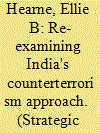| Srl | Item |
| 1 |
ID:
159373


|
|
|
|
|
| Summary/Abstract |
India has been a major victim of Islamist terrorism and has long fought against an array of Islamist terrorist groups. Since the 9/11 terrorist attacks, India's previously lonely struggle against terrorism has taken place against the background of the US-led Global War on Terror (GWOT). After outlining India's Islamist terrorist challenge, this article examines India's evolving approach to counterterrorism and how the GWOT has influenced it. It concludes that India has adopted a localized, defensive, law-and-order approach to counterterrorism which has evolved in response to various attacks over the years but still remains seriously underdeveloped. The GWOT has influenced Indian counterterrorism in important ways, although its influence has been subtle and indirect rather than transformative. The GWOT has enhanced Indo-American counterterror cooperation, shaped India's terror environment by launching the war in Afghanistan and enriched Indian counterterrorism with American experience. Just as important, it has also had an impact on India's debate on counterterrorism, civil liberties and human rights.
|
|
|
|
|
|
|
|
|
|
|
|
|
|
|
|
| 2 |
ID:
114338


|
|
|
|
|
| Publication |
2012.
|
| Summary/Abstract |
This article looks at the status quo of Indian counterterrorism policy-which largely favours 'physical' or 'hard' measures-and proposes that the government adopt a more holistic strategy. Termed 'Countering Violent Extremism', this would involve measures geared towards long-term prevention, with greater attention paid to the reasons for which people commit terrorism and to the impact of counterterrorism on communities. As such, the article focuses on 'counterradicalisation' (society-wide prevention), 'deradicalisation' (a nuanced response to convicted terrorists) and uses Islamism as a case study, with the proviso that many 'countering violent extremism measures' can also be applied successfully to other types of violent extremism.
|
|
|
|
|
|
|
|
|
|
|
|
|
|
|
|